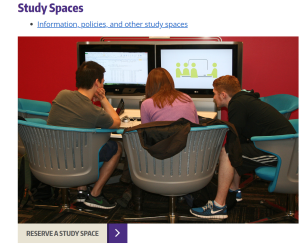As Fister’s article stated, academic libraries are working on more active ways to connect students to information that will facilitate scholarly conversation (2016) but not just by teaching them how to evaluate information, but how they can create and communicate information to their peers and hone skills for life after college.
The Ho Sik Yee Library in Hong Metropolitan University offers a DIY studio service for students that lets them make their own digital videos.
U.C. Berkeley offers a DIY Media service for instructors to use a recording space to make audio or video content that they can use to teach their classes. They are also working on a program to let undergraduate students use these services as well.

The University of Washington offers not only offers online workshops for students to hone their research skills, they offer many study spaces and rooms for conference meetings.

These types of services and makerspaces are why I’m excited to work in academic libraries, because of the many innovative services librarians are engaging in.
It’s about how space in the academic library can be utilized to create a hyperconnected environment. By having more space where students and instructors can meet together and be as innovative as possible, they are able to become more connected with each other and the work they long to do after graduation.
References
Fister, B. (2016). Reframing Libraries. Inside Higher Ed. https://www.insidehighered.com/blogs/library-babel-fish/reframing-libraries
Hong Kong Metropolitan University. (2025). DIY Studio – Library. https://www.hkmu.edu.hk/lib/using-the-library/spaces-for-different-needs/diy-studio/
University of Berkley. (2025). DIY Media. Research, Teaching, & Learning. https://rtl.berkeley.edu/services-programs/diy-media
University of Washington. (2025). Libraries Workshops. UW Libraries. https://lib.uw.edu/services/uwcontinuumcollege/libraries-workshops-in-canvas/
University of Washington. (2025). Study and Meeting Spaces. UW Libraries. https://lib.uw.edu/services/spaces/
@nicole316 You make some very strong points in this post. I can recall when the conversations about making more space available for students and faculty and staff in the academic library were starting up and some folks were very worried that all the books would be thrown away or some other awful outcome. And now it seems a bit common place that books might be stored in another place and brought to the library as needed with a very efficient system and that makes more space for everything you describe in this post.